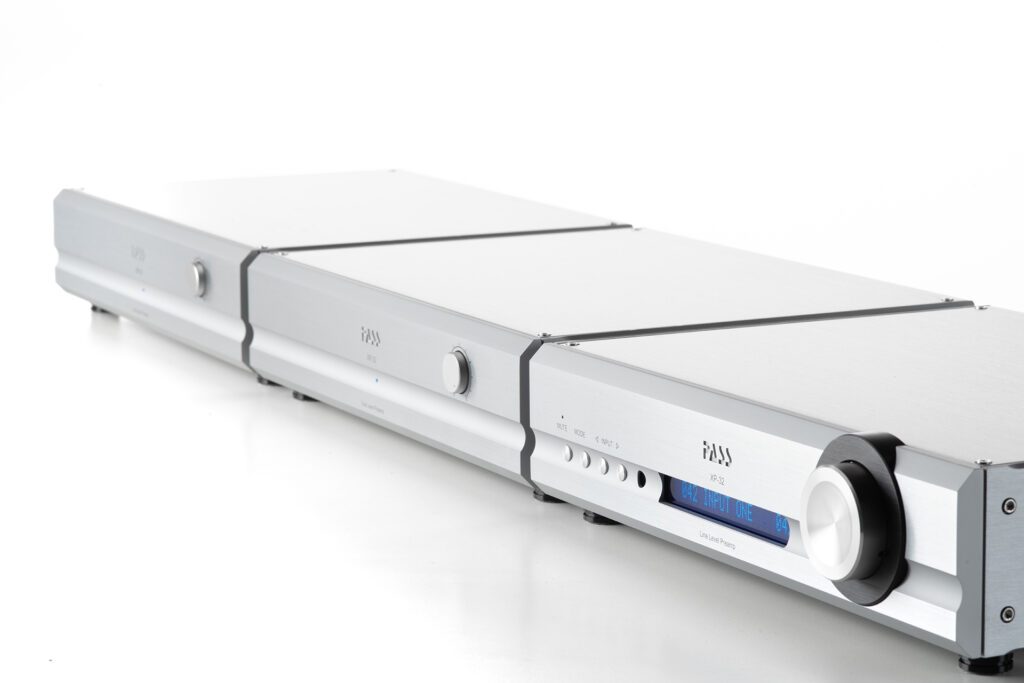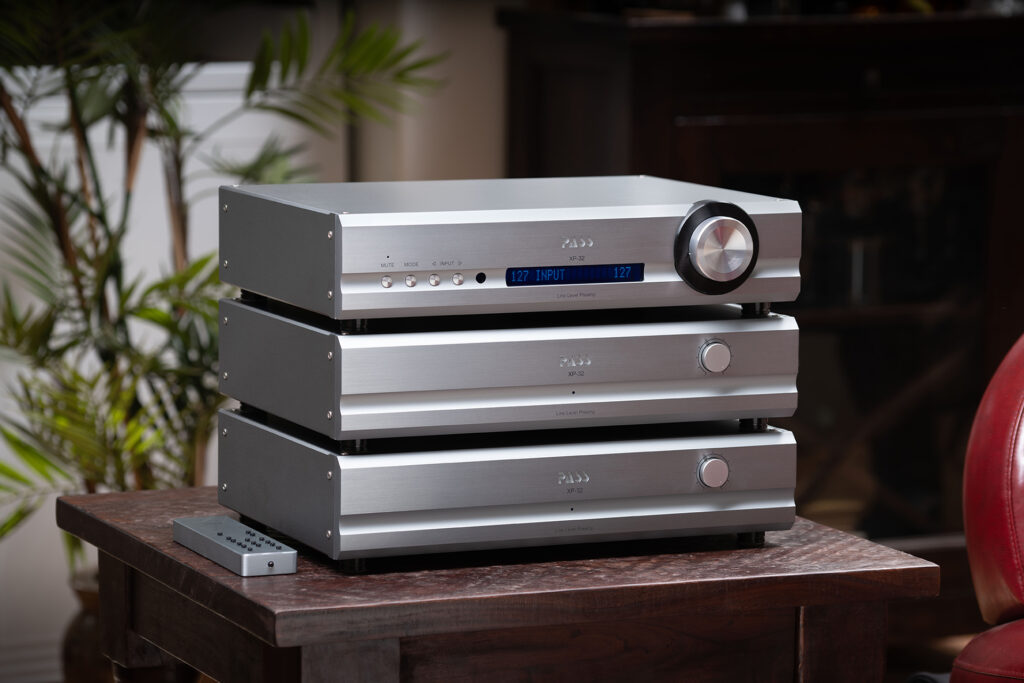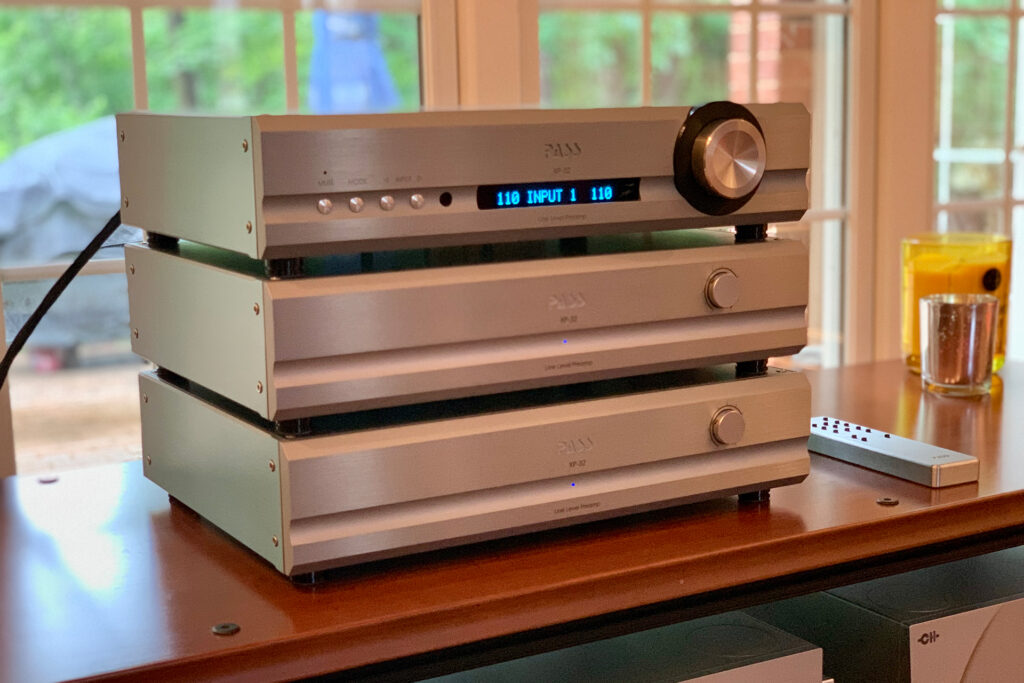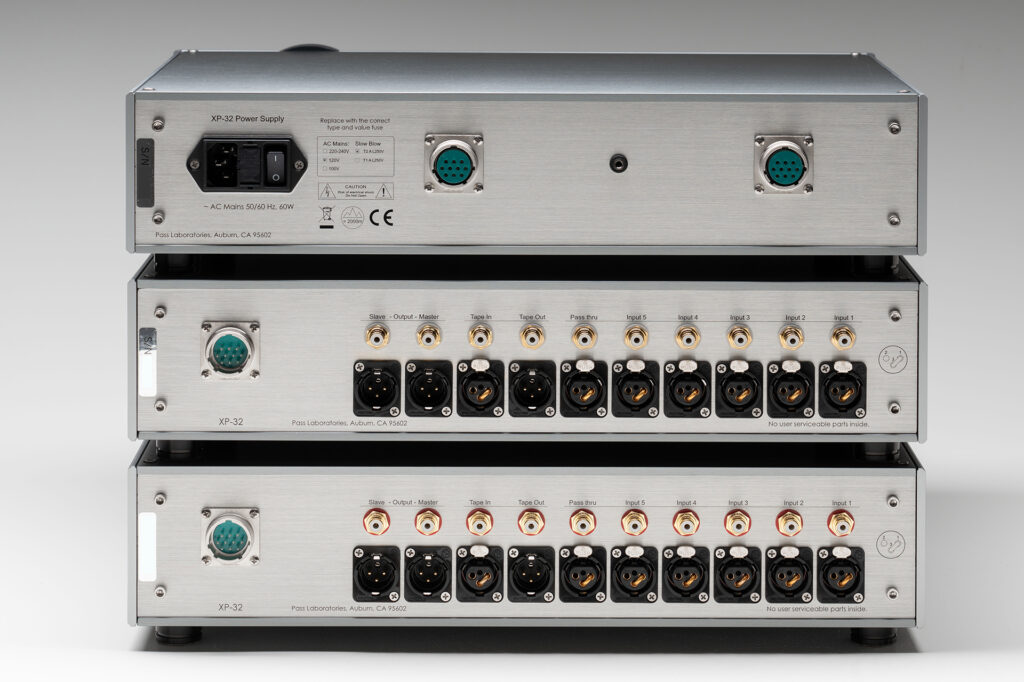I have been aware of Nelson Pass and his work in the audiophile world for a very long time. In fact, it stretches all the way back to my high school years, before Pass Labs was even a thing. My initial exposure was to his aftermarket car audio amplifier designs for SoundStream and ADCOM. Both brands were far beyond my budget as a teenager, but that didn’t stop me lusting after both of these 12-volt jewels. It was only a few years later, when I was a sophomore studying Electrical Engineering at NC State, that Pass Labs burst onto the home audio scene with a small amplifier, the Aleph, that ran at thermonuclear temperatures and sounded amazing. Eventually, the Aleph was replaced by the X Series audiophile amplifiers which, in my opinion, are still some of the sexiest high-performance power amplifiers ever produced. I still hope to own an X350.5 someday. While Nelson Pass handles most of the amplifier design, his partner Wayne Colburn is the man behind the preamplifiers.
Pass Labs stereo preamplifiers, designed by Wayne Colburn, are some of the finest in the industry, even though they do not get the credit they deserve in my opinion. The Pass Labs XP-32 in this review represents one step down from the top of the food chain, the newly-released $38,000 Xs preamplifier. It shares many of the technologies of its big brother at a far more affordable price point.

What Makes the Pass Labs XP-32 Preamplifier So Special?
- The Pass Labs XP-32 is a three-chassis stereo preamp that isolates the audio signals from the noisy power supply and control functions. There are many preamplifiers that utilize separate power supplies, but the XP-32 goes one step further. The XP-32 isolates the right channel signals from the left in their own well-shielded chassis.
- The Pass Labs XP-32 is designed for bi-amp applications. The front of each of the two audio chasses include a second volume control. These controls only function on the secondary slave outputs, letting you fine-tune a pair of amplifiers.
- The Pass Labs XP-32 employs a single-stage volume control as used in the range-topping Xs preamplifier. The XP-32 offers half-dB steps, compared to the previous XP-30, which used one-dB steps, which is a welcome change.
- The Pass Labs XP-32 offers tons of flexibility to be the heart of any audiophile system, either simple or complex. There are five inputs, either XLR or RCA, as well as a pass-through if you want to integrate a two-channel system with your home theater.
- The Pass Labs XP-32 inputs are DC, coupled again, borrowing from the Xs preamplifier, which results in greater transparency by reducing noise and distortion.
Why Should You Care About the Pass Labs XP-32 Preamplifier?
The Pass Labs XP-32 stereo preamplifier is a no-holds-barred audiophile component from a company that doesn’t follow gimmicky trends. When Pass Labs develops a product, you know that they did their homework, and it won’t be replaced with a new version anytime soon. There are some companies that are known to release a new latest-and-greatest product, only to have a Special Edition come out a year or two later, keeping their customers on the perpetual upgrade merry-go-round. Pass Labs doesn’t play this game, thankfully. They would rather build long-lasting relationships with customers than continually raid their wallets. They have been exceptionally successful in doing just that. Typical Pass Labs owners keep their equipment for a long time – often decades. They also expect (and receive) excellent customer service from a company that doesn’t take itself too seriously. While they offer expensive products, Pass Labs delivers real-world value to the audiophile looking for the absolute best our hobby has to offer in terms of not just sound reproduction, but also pride of ownership.

Some Things You Might Not Like About the Pass Labs XP-32 Preamplifier
- The Pass Labs XP-32s three-chassis design takes up a lot of space, there’s no getting around that. If you’re short on rack real estate, then you may want to consider one of the smaller but still excellent Pass Labs preamplifiers. I had the two-chassis Pass Labs XP-22 (read Jerry Del Colliano’s review here). And if you aren’t into total audiophile gluttony, like my publisher and I are, there is always the Pass Labs XP-12 (read Greg Handy’s review), which is a traditional one-chassis form factor. There is likely no one brand that our staff reviewers buy with their own money more than Pass Labs.
- The styling of the Pass Labs XP-32 is understated, which may not offer enough bling for some. Don’t get me wrong: the casework is beautifully finished, and the machining is done to a very high level. But it isn’t going to bring the WOW factor that some other brands do, and that’s perfectly fine by me. If you want bling, add a couple of Pass Labs amplifiers with their stunning blue meters, and you are all set in that department, I think.
- The Pass Labs XP-32 remote control is a hefty chunk of machined aluminum with all the functions the user needs, but it can be finicky with aiming. My system has the electronics to the side of my sitting position, and at times I struggled to get the XP-32 to see the remote.
Listening to the Pass Labs XP-32 Preamplifier …
My current system consists of a Lumin U1 mini streamer, a Weiss Helios DAC, a CH Precision M1.1 amplifier and Rockport Avior II loudspeakers. The Pass Labs XP-32 preamplifier was connected to the amplifier and DAC using Wireworld series 10 Platinum Eclipse XLR cables.
“Shape of my Heart” from Sting’s Live in Berlin album is an intimate recording of one of his biggest hits. The recording is outstanding and, if your system is up to it, it can get you very close to the in-person musical experience of being in the audience. The Pass Labs XP-32 had no problem resolving subtle cues, such as the slight echo of each gentle cymbal strike as they happened in the auditorium. The XP-32 was resolved enough that bass notes hit with both power and nuance. Nearly every pluck of the bass string was felt in my chest, then swelled until it gently tapered off. Spatially, everything was clearly placed across the stage left to right and front to back, which you will only hear in the finest stereo preamps. The Pass Labs XP-32’s lack of any audible noise gave each instrument a voice of its own, but never detracted from the overall sonic performance. I sat and listened to this song, as well as the rest of the album, oftentimes shaking my head at the beautiful sounds coming through the XP-32. The music had an authenticity that is difficult to describe, but you know it when you hear it. Effortless is the best word I can come up with in my listening notes, however it is somehow still not sufficient to explain the audiophile power that the XP-32 stereo preamp possesses. The Pass Labs XP-32 simply made me want to spend more time in my listening chair.
“Just a Job to Do” by Genesis is a hard-charging track by one of my favorite bands (Phil Collins’ Genesis, not the more progressive and earlier Peter Gabriel-fronted lineup). Their self-titled album from 1983 is packed with radio hits (remember radio?), but is not what I would consider an audiophile-quality recording. If a system can make typically mediocre-sounding recordings somehow engaging, then the designer has done their job well, as you are getting closer to the actually master tape. We all know there are far more poor, bad and downright awful recordings than there are excellent ones. An audiophile system that only sounds good with audiophile recordings is not one that we think is worthy of any of our stereo investment funds.
Phil Collins’ thundering drumming, coupled with Mike Rutherford’s outstanding bass work, makes for one of the catchiest tunes from the early 1980s. The rhythm section’s bottom end was tight and punchy through my Rockport Aviator II speakers. The nonstop bass riffs were clear and completely isolated from each other, something lesser preamps struggle with, as they tend to smear these together. The clarity and nuance of each note is a large virtue that differentiates a good system from an outstanding one. The Pass Labs XP-32 let every bit, no pun intended, of information that my Weiss Helios DAC produced flow through and end up in my ears. Uber-level audiophile performance from a high-performance component is more than just getting the musical information to your ears, although that is a good start. Cliché audiophile terms like air, timing and coherence try to describe what our brain decodes from our ears. Get them all right and you end up with something that approaches sonic magic. The Pass Labs XP-32 was one of the most elite and resolved preamps that I’ve ever had the chance to hear, not just in my reference system, but anywhere.
Will the Pass Labs XP-32 Preamplifier Hold Its Value?
The Pass Labs XP-32 is not a budget component at $18,000 for a three-chassis stereo preamp. However, it falls into the high-value category to me. This is a made-in-America, celebrity-designed, hand-crafted audiophile component made in small batches. If you are lucky enough to own one, you might never let it go. Ever. Pass preamps sell quickly at places like Audiogon.com as they are pretty limited production and the opportunity to upgrade to a Pass preamp is a tempting upgrade for many audiophiles today.

What is the Competition for the Pass Labs XP-32 Preamplifier?
The first competitor to the Pass Labs XP-32 that come to mind is the Boulder 1110 preamplifier,recently reviewed here at Future Audiophile. At $24,000, the Boulder is a bit more expensive than the Pass Labs XP-32. It is a single-chassis (more chasses doesn’t automatically mean better performance, aka the Spinal Tap Phenomenon) unit that uses internal shielding to protect the delicate stereo audio signals, compared to the XP-32, which physically isolates them with an individual chassis for each. A unique feature of the Boulder is that it uses an optical volume control, which is said to eliminate all noise from the operation. I noticed zero noise when using the XP-32 volume as well. Lesser but well-respected audiophile preamps can display a little noise from the volume pots.
I wrestled with the idea of including the $10,000 Pass Labs XP-22 (read the review) as a competitor to the XP-32 for quite some time, but feel it is a worthy comparable. I am sure that most buyers considering either worthy Pass Labs preamplifier want to know if the price difference is justified, up or down. I can speak from experience, as I have owned an XP-22 for nearly a year. The Pass Labs XP-22 is a two-chassis unit with a separate power supply, and both stereo signals in a single chassis. Obviously, the XP-32 takes things a step further in terms of isolation. So, how do they sound? The Pass Labs XP-22 is an excellent preamplifier in its own right, which I liked enough to purchase. Not surprisingly, it shares many Pass Labs sonic attributes with the XP-32. It’s transparent, well-balanced and overall a pleasure to listen to. Is the XP-32 worth $8,000 more? If you can afford it, absolutely. It takes all the good that the Pass Labs XP-22 brings to the table and makes it better, as it should. This is not to criticize the XP-22, as I feel it’s one of the best audiophile stereo preamplifier at its price point and well beyond. The XP-32 isn’t a tiny bit better – it is a lot better if you can justify the additional spend.

Final Thoughts on the Pass Labs XP-32 Preamplifier …
I struggled to find words to explain what I was listening to with the XP-32 in my system. There was no single area of its performance that stood out from the others. While this may sound like a negative perception, I assure you it is not. Let me explain …
What I found was that the Pass Labs XP-32 was one of the most well-balanced and resolved stereo preamplifiers that I have ever heard. Of course, it did everything (aka: not impart its own “house sound”) that I expect from a statement-level audiophile component. It was dead quiet and sounded extremely transparent. The XP-32 presented a very believable soundstage.
I could go on and on about all the various individual pieces of the puzzle that my ears listen for when I’m auditioning a component. However, checking all these boxes does not necessarily guarantee that I will fall in love with the component under review. Some boxes typically get checked more enthusiastically than others, if you know what I mean. Maybe the bass outshines the midrange. Maybe the soundstage is exaggerated and not realistically sized. Maybe in a quest for transparency, high frequencies get shouty or shrill.
The Pass Labs XP-32 had none of these preamp maladies. Nothing sonically stood out saying “look [or listen] to me” the way you will hear on preamps that live to be the focus of your music system. In the case of the Pass Labs XP-32, the music simply radiated from my speakers, letting me forget about the checklist in my head. The Pass Labs XP-32 stereo preamp draws you into the music and holds you there by giving you access to more of the recordings that you love so much – even the less-than-perfect-sounding ones. The Pass Labs XP-32 lets you forget about audio components completely and dive into the subtle and often magical details of your music. I can’t think of a way to pass along higher praise for an audiophile component at any price point.




Excellent review Jim!
Paul
Thanks Paul!
Thank you for the review Jim. I think Pass recommends putting each individual unit on a shelf (so using up three shelves) and the sound is better than when you stack them. Did you try both options?
Hi Philippe,
I did not try it that way, only stacked. If I wanted to separate each chassis rather than stacking however I have no doubt my wife would have veto’d that idea as that would mean taking family pictures down. More isolation is always better so I’m sure the folks at Pass are correct and their XP-32 would have sounded even better.